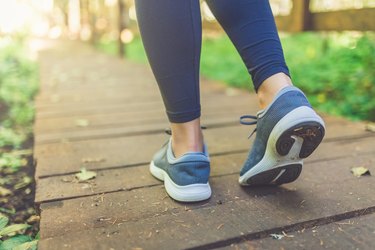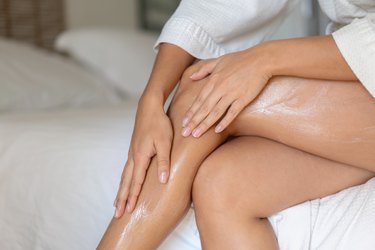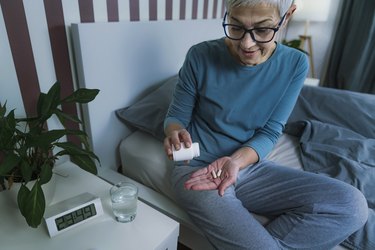
Technically classified as a sleep disorder (and even more specifically, a neurological sensory sleep disorder), restless legs syndrome (RLS) — or Willis-Ekbom Disease — is estimated to affect up to 10 percent of people in the U.S.
The disorder, as the name implies, is marked by an irresistible urge to move the legs — typically in the evening or at night — and uncomfortable sensations in the legs that can feel like burning, aching or tingling.
Video of the Day
Video of the Day
"Restless legs syndrome is a funny, creepy-crawly sensation that patients experience when they're about to go to bed," explains Jyoti Matta, MD, medical director of the Center for Sleep Disorders at Jersey City Medical Center. "The syndrome feels like an irresistible urge to shake or move your legs. It can feel like ants crawling on you. "
Unfortunately, RLS is a lifelong, chronic condition that does not have a known cure. However, there are some home remedies for restless legs syndrome relief, as well as a few medications for RLS that your doctor may recommend.
Tip
It's important to work with a doctor if you're having symptoms of RLS, because it can severely affect the quality of your life and, especially if sleep is impaired, lead to disruptions in your daytime routine, job performance, relationships and more.
1. Try a Warm Bath Before Bed
For instant relief from restless legs at night, Dr. Matta suggests finding a bedtime routine that primes your body to relax before RLS can kick in. She especially recommends taking a warm bath to help you wind down.
Other soothing activities to try include bedtime meditation, reading, stretching and light yoga.
2. Do Moderate Exercise

Dr. Matta also recommends exercise, which can serve the dual purpose of helping to physically relieve the symptoms of restless legs and helping you sleep better at night. (Interrupted sleep is one of the biggest problems with RLS, so anything you can do to get better sleep will help with the overall condition.)
However, there are two important caveats when using exercise for RLS:
- You should never exercise right before you go to sleep.
- The exercise should be kept to moderate levels only (think: walking, light jogging, biking) so it doesn't increase stress levels or trigger symptoms
In some cases, exercise can make restless legs syndrome worse, so be sure to stick to daytime workouts and keep the activity levels on the lighter side.
Tip
The Physical Activity Guidelines for Americans recommend adults get at least 150 minutes of moderate exercise each week (that's about 30 minutes a day, five days a week).
3. Skip Caffeine, Tobacco and Alcohol
Using these substances can cause RLS symptoms to flare up for some people, according to the American Academy of Family Physicians. Try cutting them out of your day to see if they improve your symptoms.
Easier said than done, we know. But here are some tips to help:
4. Consider Certain Diet Changes

There isn't one specific food that has been found to worsen or help with RLS symptoms.
Foods to Avoid
However, Dr. Matta stresses that it's important to avoid sugary foods and snacks, especially in kids. (Some people report sugar as a trigger for their RLS, but a link hasn't been found in research. Still, it may be worth cutting down on foods with added sugar to see if it helps.)
Foods to Eat
As far as what foods you should eat, the Cleveland Clinic recommends adding foods rich in iron, folate and magnesium — all of which have been found to help with RLS symptoms — to your diet.
These include:
- Spinach
- Seafood
- Beans
- Whole-grain breads
- Lentils
- Almonds
- Edamame
Additionally, Dr. Matta says staying hydrated can help decrease symptoms. (Just be sure you're sipping on caffeine-free fluids, like water.) A good general guideline is to drink half your weight in ounces each day. So, if you weigh 180 pounds, for example, aim to drink about 90 ounces (or 11 glasses).
5. Reduce Your Stress
Oh, look — it's our old friend, stress. You're probably sick of hearing about how stress affects pretty much every health condition known to humankind, but it's the truth.
"Stress and anxiety play a role in everything," notes Dr. Matta. She adds that stress and anxiety can both trigger RLS, though people can sometimes go for days without symptoms. In other words, you could have restless legs days after you actually experienced the stress.
Anything you can do to relieve your stress can be helpful for both RLS and your overall health. Here are a few methods to try:
- Adjust your work schedule to be less demanding, if possible.
- Prioritize self-care activities like exercise and meditation.
- Consider gratitude exercises like journaling.
- Find a therapist who can help you identify stress triggers and establish healthy ways to manage stress.
6. Use a Weighted Blanket
While there isn't any clinical data on using weighted blankets for restless legs syndrome, Dr. Matta says they can be a helpful at-home remedy for a few different reasons:
- First, because they're "snug and cozy," so they can help with the physical sensations of RLS.
- Secondly, because they're warm, which can help induce sleep.
- Finally, because they can provide effective stress relief, which can help decrease cortisol levels and reduce symptoms.
A weighted blanket on the legs can also be helpful for treating restless legs during pregnancy, because it's a medication- and treatment-free solution that can be implemented right at home.
7. Add Some Stretching

Dr. Matta is a big fan of incorporating yoga and stretching into your daily life if you have restless legs syndrome. "I believe in yoga and stretching," she says. "It helps with both good-quality sleep and restless legs."
And a January 2020 study in the Journal of Clinical Sleep Medicine also confirms that yoga is a good choice for people with RLS: The study found that a daily yoga routine that incorporated both class and at-home sessions over 12 weeks reduced RLS symptoms and severity, lowered stress levels in participants and improved their mood and sleep.
Wondering where to start? Try these 10 best yoga poses for beginners, according to an instructor.
8. Ask About Iron Supplements
As John Hopkins Medicine explains, another theory about RLS is that it's linked to low levels of iron. Thus, taking a daily iron supplement might help relieve symptoms. (It's important to note, though, that if your RLS isn't caused by low iron, then taking an iron supplement won't help. So be sure to get a blood test to confirm your iron levels before turning to a supplement.)
Talk to your doctor about how much iron you should take, but John Hopkins notes that taking 325 milligrams of ferrous sulfate twice a day on an empty stomach for three months has helped some people improve their RLS symptoms.
Alternatively, you could try increasing your food sources of iron, including meat, poultry, fish and seafood, lentils, beans and spinach.
Tip
Eating foods high in vitamin C with iron-rich foods can boost your iron absorption.
9. Consider Medications

If lifestyle changes alone aren't effective, medication therapy is also an option. While there isn't one best medication for restless legs syndrome, Dr. Matta says there are different classes of drugs to try.
One of the most common types of medications used for restless legs syndrome are those that affect dopamine pathways in your brain, such as Ropinirole and Pramipexole. Some cases of RLS may be caused by a disruption of the dopamine pathways, according to the National Institute of Neurological Disorders and Stroke (NINDS), so giving medicine that increases dopamine might help.
These drugs can cause unpleasant side effects like nausea and lightheadedness, though, so they're often started at very low doses.
Sometimes anti-seizure medications, opioids and/or benzodiazepines may also be used. However, these are usually last-resort methods, and benzodiazepines especially can induce or worsen sleep apnea, per the NINDS, so any medication should only be used under a doctor's care.
Warning
If you're pregnant or have an underlying medical condition, medication may not be the right choice for you. Make sure to tell your doctor about your medical history and any other symptoms you're experiencing.
10. Look Into Acupuncture
An October 2017 study in the Journal of Acupuncture & Meridian Studies found that acupuncture sessions were helpful in reducing RLS symptoms. However, there was a pretty significant catch: The acupuncture sessions were given alongside an anti-seizure medication.
But the study did find that the people who received both the medicine and the acupuncture had better symptom relief than those who had just the medicine alone, so that's a definite point for the acupuncture category.
If you have access to a certified acupuncturist and your symptoms are affecting your quality of life, it's definitely worth a shot. (Pun intended.)
11. Try Massages

For instant relief of restless leg syndrome, nothing may be as effective as a massage. Both leg and foot massage can be helpful, and Dr. Matta adds that pressure-point foot massages may be especially useful.
If your budget allows, at-home leg and feet massagers can be useful, but if they're outside of your price point, Dr. Matta recommends manually massaging your calves with a calming oil like lavender.
It can be difficult to stop restless legs immediately, she says, but many people find massage to be a helpful at-home remedy.
Try It
LifePro RelaxaTilt X Foot Massager
Buy it: Kohls.com; Price: $179.99
12. Wear Compression Stockings
Along the same vein, Dr. Matta says that for some people, compression stockings or sleeves might help relieve symptoms.
If you have a job that involves being on your feet a lot, it might be helpful to wear the compression stockings during the day, too, to help ward off the symptoms starting in the evening.
Try It
OrthoSleeve FS6+ Compression Leg Sleeves
Buy it: Orthosleeve.com; Price: $59.99
13. Ask About Melatonin

Because RLS is technically a sleep disorder, getting enough sleep is crucial to managing it. However, if you're tempted to try melatonin to help you get that elusive sleep, proceed with caution.
"Melatonin is tricky," Dr. Matta says. She explains that some studies have found that melatonin can help a person experiencing RLS to fall asleep, but for others, it can actually make symptoms worse.
She suggests keeping a sleep diary to help you decipher what therapies are helping you sleep and which may interfere with your sleep. And if you find that melatonin is making your symptoms worse, definitely discontinue use and talk to your doctor about next steps.
Warning
If you're pregnant, talk to your doctor before trying melatonin or any other supplement.
What About Quinine?
Some people believe that taking quinine, drinking tonic water (which contains this ingredient) or taking the malaria drug quinine sulfate (aka Qualaquin) can help with RLS or leg cramps, but there's no evidence to support this.
In fact, the FDA has explicitly warned against using quinine for this purpose because of the risk of serious side effects including serious bleeding and permanent kidney damage.
When to See a Doctor
While home remedies for restless legs syndrome may be helpful, Dr. Matta stresses that it's always important to see a doctor about your symptoms. In some cases, RLS can be caused by kidney disease or iron-deficiency anemia, so treating the underlying cause can cure the RLS.
Additionally, your doctor may recommend seeing a sleep disorder specialist, who can help with additional strategies, especially if your sleep is being severely disrupted.
- National Institute of Neurological Disorders and Stroke: "Restless Legs Syndrome Fact Sheet"
- John Hopkins Medicine: “Causes of Restless Legs Syndrome”
- Cleveland Clinic: “What to Eat If You Have Restless Legs Syndrome”
- Journal of Clinical Sleep Medicine: “Effects of a 12-week yoga versus a 12-week educational film intervention on symptoms of restless legs syndrome and related outcomes: an exploratory randomized controlled trial”
- Journal of Acupuncture & Meridian Studies:“Evaluation of Acupuncture in the Treatment of Restless Legs Syndrome: A Randomized Controlled Trial”
- Sleep Medicine: “Effects of melatonin and bright light administration on motor and sensory symptoms of RLS”
- FDA: "FDA Drug Safety Communication: New risk management plan and patient Medication Guide for Qualaquin (quinine sulfate)"
Is this an emergency? If you are experiencing serious medical symptoms, please see the National Library of Medicine’s list of signs you need emergency medical attention or call 911.


